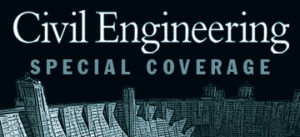OVER CENTURIES, natural disasters have brought people together. When Hurricane Michael battered the Gulf Coast in 2018, first responders and local organizations across the United States rallied in support of those affected. When wildfires recently raged through Australia, more than 3,700 firefighters from around the world rushed to help battle the flames. It’s in these moments that humanity comes together as one. But when the world faces biological crises, like the COVID-19 outbreak, how do we come together while maintaining physical distance, or as we know it now, social distancing? We do it through resilient infrastructure.
With the COVID-19 pandemic, humanity faces a common threat that brings us together as a global community. It doesn’t discriminate by race, gender, or religion. And during these vulnerable times, civil engineers play a special and vital role because of our priority as outlined in Canon 1 of ASCE’s Code of Ethics: Engineers shall hold paramount the safety, health, and welfare of the public.
When the crisis calls for isolation, human beings still need to be able to communicate. Yet it goes beyond connectivity. An outbreak of this magnitude puts into perspective the type of infrastructure needed such as shelters, water and wastewater, energy, communication, medical, and other essential facilities.
Much of our other infrastructure, like roads, bridges, tunnels, railroads, airports, and ports that connect places and people around the world, is also needed to transport goods and services. Digital infrastructure, such as transmission towers, communication conduits, and server facilities, including their cooling systems, must be resilient and able to support a high volume of user traffic and data packets.
Thus, civil engineers’ role is essential in keeping society functioning while giving the government and first responders the groundwork to manage and mitigate the crisis.
Civil engineers’ role is essential in keeping society functioning while giving the government and first responders the groundwork to manage and mitigate the crisis.
But modifying the built environment is only one step. Civil engineers must also focus on creating resilient infrastructure that can mitigate biological viruses and threats. Copper is the first and only Environmental Protection Agency-approved metal to have antimicrobial properties that resist bacteria and viruses like COVID-19. In 2015, researchers found that hospitals using copper alloys in hardware and supplies had reduced infection rates by 58 percent. Despite impressive results, the cost of copper is its main drawback. Including copper in our infrastructure falls on all of us in government, academia, and the industry. This opens the discussion with those with an entrepreneurial spirit out there on “what other materials are possible in creating resilient surfaces for the infrastructure of the future.”
During this pandemic, members can find support from ASCE’s COVID-19 resource page. As the Society monitors the developing situation, the web page helps you stay connected with those in the civil engineering community. For us to respond to this crisis, we must share lessons and best practices we learn during these extraordinary circumstances.
The COVID-19 crisis, while stressful, is a unique opportunity for humanity to come together. As planners, designers, and builders, it’s our collective responsibility to innovate new materials that don’t allow viruses to survive on their surfaces and to connect the global community with resilient infrastructure. I remain optimistic about the outcome of this pandemic and wish each of you the best for a safe and healthy future.
On behalf of your fellow ASCE members and staff, we want to extend our deepest sympathies to those who have been affected by the coronavirus crisis. We will continue to keep you and your loved ones in our thoughts as we navigate through these difficult times. We sincerely hope that you can find comfort from your ASCE friends and family.



